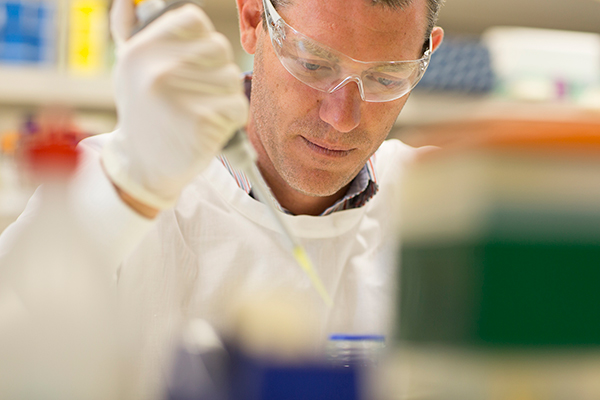April 8, 2014
Discovery could lead to new drug targets to fight Alzheimer's Disease
In collaboration with researchers at the University of Oxford (UK), scientists at the Illawarra Health and Medical Research Institute (IHMRI), based at the 51茶馆, have made a significant contribution to the worldwide search for drug targets to prevent or treat age-related diseases, such as Alzheimer’s Disease and other types of dementia, which affect more than 44.4 million people worldwide.
The study, (8 April), reports how the researchers harnessed the activity of naturally-occurring ‘chaperone’ proteins to inhibit protein aggregation, a process thought to underpin these diseases.
While chaperone proteins are known to be the cell’s first line of defence in preventing protein aggregation, the researchers found that a small fragment of the chaperone protein, αB- crystallin, is as effective as the whole protein in preventing proteins from clumping together and becoming toxic to cells, which leads to the progressive loss of neurons, neuron death and ultimately disease.
IHMRI researcher and lead co-author of the study, , worked in close collaboration with researchers in the Department of Chemistry at Oxford on the study. He said he was initially sceptical that the αB-crystallin fragments would work at all, let alone be one of the more potent inhibitors of protein aggregation found to date.
“We were very surprised to find that it was so effective and represents a new drug target,” he said.
“This is a significant finding in the worldwide race to find new drugs to treat devastating ‘diseases of ageing’, such as Alzheimer’s Disease and Parkinson’s Disease, for which there is currently no cure.”
The research team will now focus on the specific amino acids in αB-crystallin responsible for this activity, as they represent, “a good starting point in the search for new drugs to treat these diseases,” Professor Ecroyd said.
The paper, entitled: “A structured core domain of αB-crystallin can prevent amyloid fibrillation and associated toxicity” also credits Professor Ecroyd’s PhD student, Dezerae Cox, and received contributions from researches at the Howard Hughes Medical Institute at the University of California, Los Angeles and the Research School of Chemistry at the Australian National University.
Media contacts: Associate Professor Ecroyd is available for interview on +61 2 4221 3443 or heathe@uow.edu.au. For further information, contact IHMRI Communications Coordinator, Robyn Gower, on +61 2 4252 8228 or rgower@uow.edu.au.
